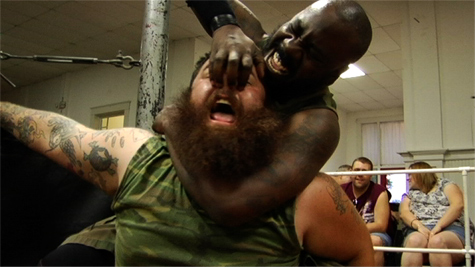
IN YOUR FACE But it’s just wrestling for show. |
Almost any documentary about a niche hobby or creative outlet (think Every Little Step or Spellbound) devotes some amount of screen time to the therapeutic value of such unlikely obsessions. This trope is definitely perfunctory, and its impact can run the gamut from affirming to awkward. So, what to make — in the case of Robert Greene's latest documentary, Fake It So Real, playing at SPACE Gallery on Valentine's Day — of a group of guys who dress up in tights, masks, and makeup, and more or less just pretend to beat the shit out of each other? The potential for psychodrama is rich.
It's sort of a surprise, then, to find that one of the overriding takeaways of Fake It So Real — about the members of a DIY wrestling league in North Carolina — is how normal most of its characters are. Most have day jobs and some have checkered pasts, while others have overcome strong physical limitations and some just love the sport. But the unifying highlight of their weeks is the five to fifteen minutes of their Saturday night spent in a modest limelight, as anywhere from a few dozen to a couple hundred people cough up five bucks to watch them perform as pseudo-gladiators.
To its unyielding credit, Greene's film is barely about why its characters have devoted themselves to a cause that is quirky and, at least financially (the league barely recoups the cost of renting venues), thankless. It is much more the story about two things: male bonding; and a group of artists at work, crafting a story that will ideally elicit a strong reaction from its audience.
Greene and his massively talented cinematographer, Sean Price Williams, have a knack for elevating everyday exchanges into an iconic realm. A previous collaboration, Kati With an I, attained transcendence through portraying just how mundane much of teenage romance can be. Something similar happens here in scenes of these guys simply hanging out and planning an upcoming fight night, and the conversations inevitably come to revolve around the league's youngest member, Gabe.
Gabe is a great case study in how difficult it is to create an effective wrestling persona. His gimmick is to portray an angel named Gabriel, an inspirational protector and combatant against evil, but his ever-changing attempts at flair are hilariously misguided, from a rainbow-colored halo he wears over his head to a hand-signal meant to represent a trumpet blaring that looks more like someone requesting a beer at a bar. Gabe's constant refrain is "What do you think I need to work on?" (the film's best running gag), and the responses are remarkably learned (e.g., "You're trying to write this guy a bibliography when you should just be writing him a quote").
These talks also lead to some occasionally possibly homophobic ribbing that constitutes a surprising chunk of Fake It So Real. (First line: "I am not a fag.") That said, these exchanges are so nuanced they could serve as the basis for a decent term paper on the subject, shifting from obvious, good-natured jokes to rather tense interrogations of Gabe's sexuality. Greene's treatment of the issue is at once judicious and naturalistic, capturing the discomfort of such aspersions without making any of its characters seem like jerks.